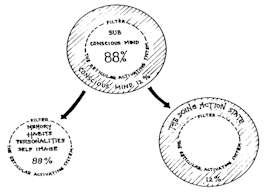Why should I consider weight release and healthy weight loss treatments?
There are many reasons that can contribute to our body's becoming overweight, some of which have little to do with what you eat, but rather why you are eating. We have helped hundreds of people release weight without stress and end the cycle of weight loss and regain, by applying the CALM techniques. What I teach covers three important areas which are usually overlooked when considering weight loss. Not all of them may apply to you, although I have detailed them for your understanding of how I approach this area:
- How to develop self-confidence to release weight
- Understanding subconscious desires which support weight gain
- Reprogramming these subconscious desires to support weight release
How Do We Develop Self-confidence To Release Weight?
A good way to explain this idea is to consider the scientific work of Dr Maxwell Malz. He was a plastic surgeon who noticed that his repairs to people did not necessarily have any effect on some people. In the case where people suffered lack of self-confidence because of physical disfigurement, he found that his operations to change the disfigurement gave the patients no improved hope, because they still lacked confidence, since they were still damaged on the inside. Malz found that he had to accompany his surgical work with a process of mental work, creating "imagined memories" and building in his patients the thoughts of a possible new life. Malz also describes cases in Psycho-Cybernetics where the patient has formed a negative image of something which is actually healthy, for example a nose. One patient came to him complaining that her nose was grossly oversized, so much so that she felt she was disfigured. It so happened that she also suffered a personality disorder.
Malz managed to prove to this patient that her nose was normal and gave her a program of mental exercises to do so that she would come to believe this. She did the exercises for 21 days and slowly her mind changed until she perceived her nose as normal. As her bad image of her nose disappeared so too did her personality disorder.
Although you may not feel that you are as severely challenged as Maltz' patients, you can still apply the same process and achieve the same sort of self-confidence to help you achieve what you believe to be your ideal weight.
It is interesting to read of those who have applied a similar technique, as it is often associated with a tremendous personal accomplishment, sometimes against all odds: .jpg) "I brainwashed myself into thinking I could and would win! I visualised exactly what was going to happen tonight. It's hard to explain but when you are focused you almost have no thought. Sitting behind the blocks I was 100% focused and I didn't have a single thing in my mind. I got in there, I knew what I had to do and it was just a matter of letting my instincts take over"
"I brainwashed myself into thinking I could and would win! I visualised exactly what was going to happen tonight. It's hard to explain but when you are focused you almost have no thought. Sitting behind the blocks I was 100% focused and I didn't have a single thing in my mind. I got in there, I knew what I had to do and it was just a matter of letting my instincts take over"
Kieren Perkins, interviewed after his "miracle" 1500m Gold Medal race Atlanta Olympics 1996, as reported in "The Sun Herald" July 28 1996.
Finally the most important thing I would like to add to all this is that you do not have to believe that you can achieve the weight goal - simply doing the mental exercises is enough!
Understanding Subconscious Desires Which Control Weight Gain
Basically we are aroused by only two sensations, pain and pleasure. We all want to avoid pain and pursue pleasure. The emotional cycle which can lead to depression begins in the present with our initial experience of pain or pleasure, and ends with complex feelings which are "remembered" exclusively in the past. This cycle of emotions has been found by psychiatrists to follow this pattern:
- Pain in the present is experienced as hurt
- Pain in the past is remembered as anger
- Pain in the future is perceived as anxiety or fear
- Unexpressed anger, redirected against yourself and held within is experienced as guilt
- The depletion of energy that occurs when anger is redirected inward creates depression.
Hurt is stored because the body retains a primitive subconscious ability to remember every incident that it experiences. This is called conditioning and it is part of the way we learn.
These "hurts" which become "conditioned subconscious reflexes" are subsequently modified by our behaviour. Let's consider some examples of how this happens.
A baby cries out of fear because something has scared it. A well-meaning mother misinterprets the cry for help as a cry for hunger and feeds the child. The food tastes good and makes the child feel better and a new association between fear and food as its comforter is formed.
New Conditioned Reflex
I become afraid à I desire food because I know food will make me feel better
A young lady breaks up with her first boyfriend. She feels upset and depressed. Her well meaning friends take her out and treat her to a "junk food frenzy". The food makes her feel better and a new association between food and overcoming emotional depression is formed
New Conditioned Reflex
I become depressed à I desire food because I know food will make me feel better about my depression
Therefore a lot of eating habits are misdirected reactions to emotional distress. Many of them have been created at an early age and become such a part of us that we do not notice them or they lie dormant until the appropriate emotional "condition" is experienced, activating the reflex resulting in "the eating binge".
Although understanding your relationship to this component of weight release can take longer and requires greater insight and courage to accomplish, when it is achieved a lasting cure usually results.
Reprogramming Subconscious Desires Which Control Weight Gain
 Your mind has two components each with separate functions. There is the conscious mind, which is 12% of our mind, and the subconscious mind, which is the other 88%. The conscious mind is the one we readily identify with, it is our "doing state" that we use to perceive the world and make decisions with such as "I would like to release weight". The subconscious mind is responsible for storing our memory, habits ("when I get upset I like to eat a whole apple pie!"), personality, self-image and controls our bodily functions (notice you don't have to consciously think about doing these things).
Your mind has two components each with separate functions. There is the conscious mind, which is 12% of our mind, and the subconscious mind, which is the other 88%. The conscious mind is the one we readily identify with, it is our "doing state" that we use to perceive the world and make decisions with such as "I would like to release weight". The subconscious mind is responsible for storing our memory, habits ("when I get upset I like to eat a whole apple pie!"), personality, self-image and controls our bodily functions (notice you don't have to consciously think about doing these things).
Although we can become aware of our subconscious compulsions towards food we often have difficulty in changing them. When we form a conscious desire ("I want to lose 2kg") we come up against our existing habit ("If I experience too much stress I'm off to the nearest Fast Food outlet!"). This is therefore 12% of your mind battling with the other 88%. If you attempt to make this a battle of conscious will, you normally experience stress as you fight to discipline yourself to keep to your diet plan, enduring much pain and suffering. It is for this very reason that most people will either deviate from their diet within a week of starting, or give up completely. The conflict between the conscious and the subconscious mind is fought inside on an emotional level; a conflict which you do not need to experience if you understand how one can control the other.
In the Life Skills Seminar I teach you how to release weight by teaching and practising the following skills:
- How to relax and release stress
- A scientific explanation of how the brain works
- Methods for effective goal setting
- How to develop self-confidence to release weight
- Understanding subconscious desires which support weight gain
- Reprogramming these subconscious desires to support weight release.
You can register for a seminar in your area even though one may NOT yet listed.
You May Ask "How Effective Are These Techniques in weight release?"
There are two ways in which I can answer this.
Firstly I can let some seminar participants explain in their quest of weight loss:
 I had been a fairly heavy smoker (30 a day) for 27 years. I did not make a big deal about the smoking as a goal, but it was there in the background the whole time. On the Wednesday following the seminar I had my last cigarette after dinner. Very cool, no fuss - I just KNEW it was my last cigarette. A week later I still had no urge to smoke (just a feeling of "what's missing?" I haven't been irritable or cranky (haven't beaten the kids once!) and I feel just great and not a little pleased with myself. I went on and applied the techniques to releasing weight. I released 5 stone (that's 31 kilos) - my self esteem soared, relationships improved - you can just imagine all the great effects can't you? I feel just great!
I had been a fairly heavy smoker (30 a day) for 27 years. I did not make a big deal about the smoking as a goal, but it was there in the background the whole time. On the Wednesday following the seminar I had my last cigarette after dinner. Very cool, no fuss - I just KNEW it was my last cigarette. A week later I still had no urge to smoke (just a feeling of "what's missing?" I haven't been irritable or cranky (haven't beaten the kids once!) and I feel just great and not a little pleased with myself. I went on and applied the techniques to releasing weight. I released 5 stone (that's 31 kilos) - my self esteem soared, relationships improved - you can just imagine all the great effects can't you? I feel just great!
Julie Van den Driesen, VIC
 Dear Sandy,
Dear Sandy,
So much has happened during 12 months of my life when I felt everything had ground to a halt and there was no hope of anything changing. I was trying to recover from a major depression, I weighed 12 stone, my marriage was in a bad state and I felt I had no future.
I decided to try the methods you taught even though I was a little sceptical. The goal I set at the seminar was about releasing weight. Now 12 months later, I'm 3 stone lighter. As the weight began to go, I started using Alpha to get through difficult day to day situations and to relax in general. As I became more relaxed, I was able to think more clearly about what I wanted and started to set and achieve goals.
I don't want it to sound like the CALM Seminar instantly solved all my problems. I still battle depression on a daily basis and my marriage, though much more secure and happy, still has problems. The greatest difference is that now these 'problems' don't totally overwhelm me. I feel I have the tools I need to tap into my own power and deal with things as they happen. I can see that things can change and that I now have the power to change the way I act and feel when confronted by problems. Instead of problems running my life, I feel in control again and therefore have a future.
Thank you Sandy
Erika Gelzinnis, NSW
You can register for a seminar in your area even though one may NOT yet listed.
Secondly
The CALM techniques are so effective that leading Australian author on health, Professor Garry Egger of Deakin University, who runs the "Fat Loss Leaders Program" teaching the latest mind/body health and fitness techniques to dietitians and consultants, has asked me to teach the entire content of the first day of my Life Skills Seminar.
So What is the Next Action Step that You Can Take to Release Weight?
CALM makes suggestions on how you can develop your skills in dealing with Releasing Weight using Sandy MacGregor's low cost Tapes, Books, CDs, Videos and Seminars which have been utilised by thousands of people successfully since 1990.

 Online store
Online store Seminar Information
Seminar Information Short talks
Short talks Books
Books Audio CDs
Audio CDs DVDs
DVDs Packs
Packs Coaching
Coaching Meditation
Meditation


Comments